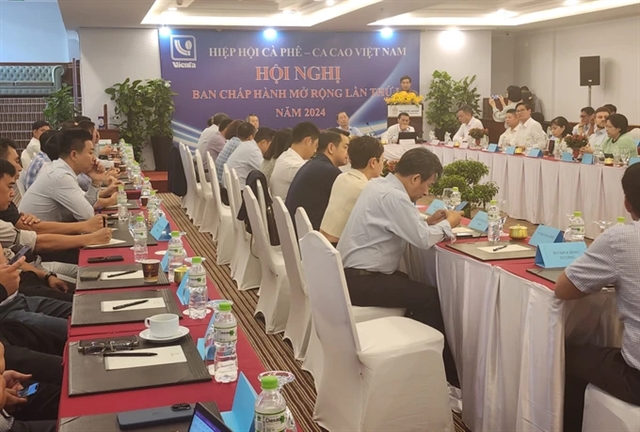 Economy
Economy


|
| The executive board of the Việt Nam Coffee Cocoa Association (VICOFA) held a meeting at The Rex hotel in HCM City on April 11. — Photo by sggp.org.vn |
HCM CITY — The executive board of the Việt Nam Coffee Cocoa Association (VICOFA) held a meeting at The Rex hotel in HCM City on April 11.
It discussed the challenges faced by coffee businesses and foreign-invested companies, and how to achieve sustainable development for Vietnamese coffee and sustain its credibility in the global market.
Đỗ Hà Nam, chairman of VICOFA, said in March Việt Nam exported 185,281 tons of coffee for US$680.86 million, a decrease of 11.9 per cent in volume but increase of 41.1 per cent in value from the same period last year.
In the first six months of the 2023 - 2024 coffee season, Việt Nam exported over 956,000 tons for over 3 billion.
Most of the exports -- over 825,000 tons -- were of robusta, which fetched $2.3 billion.
Meanwhile, since March 2023, domestic coffee prices have been rising rapidly, going from VNĐ47,000 (US$1.9) per kilogramme then to over VNĐ100,000 now.
This has affected the domestic coffee industry.
According to VICOFA, the coffee-growing area is set to drop from 700,000 hectares to 600,000ha due to intense heat and a severe lack of irrigation water, particularly in the Central Highlands.
The rapid increase in prices is associated with high risks for companies buying coffee for exports through agents and traders.
This has caused them significant losses and generally tarnished the reputation of Việt Nam's coffee industry.
According to delegates attending the meeting, with domestic prices being as high as they are, they might soon import coffee from other countries for roasting and processing.
VICOFA officials said last year Việt Nam had to import 200,000 tons of coffee, and this year the volume could increase.
The price increase also causes a challenge for businesses since they need large sums of money but banks do not lend enough.
Thái Như Hiệp, vice chairman of VICOFA, said for the coffee industry to develop sustainably, stakeholders in the value chain need to share risks and strengthen cooperation.
Foreign-invested companies should collaborate more closely with VICOFA to work directly with major reputed export companies and avoid buying from less credible small-scale businesses, he said.
Vietnamese businesses should limit stockpiling to minimise risks and need financial support from banks to buy coffee from growers amid the sharp rise in coffee prices, he added. — VNS




